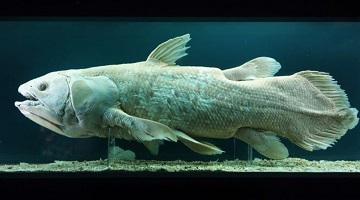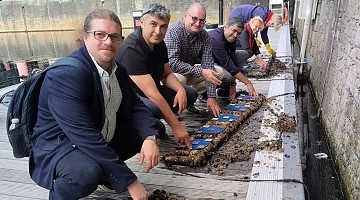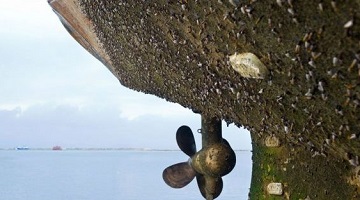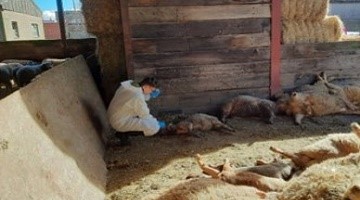Why study this course with LJMU?
- Investigate climate and environment sciences using interdisciplinary skills to tackle pressing issues
- Taught by highly experienced, research-active staff
- Focus on skill acquisition via practical workshops and field learning
- Field trips included in the fees, currently to Iceland, the Lake District, Snowdonia, the Peak District and the North West coast*
- Access to brand new, state-of-the-art computing facilities and analytical equipment
- Excellent employment opportunities in areas such as: climate environmental management; consultancy; operational government authorities; engineering and surveying; civil service; and Geographical Information Systems
- Options to undertake work placements of 4-6 weeks and/or 12 months
- Options to study abroad for part of the degree with support from schemes such as the Go Global Fund and Erasmus+
- This degree is available to study following a foundation year
About your course
Climate Change is a pressing issue facing society. Rising temperatures and sea levels, near global retreat of glaciers, alterations to precipitation patterns and frequent extreme weather events, climate-induced changes in biogeographical patterns and loss of biodiversity pose threats to current and future societies.
This BSc in Climate and Environment Sciences will allow students to explore many different aspects of climate change in detail. Climate change is the most pressing issue facing today's society and our ability to understand the causes, impacts and potential mitigation strategies is vital for future populations. It is also vital to increase our capacity to communicate this to the public.
This programme has developed in direct response to this clear need for graduates with the knowledge and practical skills required to tackle climate change.
This course will provide a fully integrated study of climate change and climate science. It will cover the scientific, political, societal, economic aspects of the science, with full discussion of cutting-edge aspects of the subject.
This will provide students with ample background and practical knowledge for understanding climate change. The course will deliver extensive practical experience using Geographic Information Systems and Remote Sensing technologies and field-based learning.
Course modules
What you will study on this degree
Further guidance on modules
Modules are designated core or optional in accordance with professional body requirements, as applicable, and LJMU’s Academic Framework Regulations. Whilst you are required to study core modules, optional modules provide you with an element of choice. Their availability may vary and will be subject to meeting minimum student numbers.
Where changes to modules are necessary these will be communicated as appropriate.
Core modules
Core modules
Optional Modules
Core modules
Optional Modules
Your Learning Experience
Excellent facilities and learning resources
We adopt an active blended learning approach, meaning you will experience a combination of face-to-face and online learning during your time at LJMU. This enables you to experience a rich and diverse learning experience and engage fully with your studies. Our approach ensures that you can easily access support from your personal tutor, either by meeting them on-campus or via a video call to suit your needs.
Teaching will include classroom, laboratory, online and field-based learning. A fully hands-on approach is taken, with emphasis on the development of practical skills across a wide range of subjects alongside substantial knowledge development. GIS and development of computer literacy is an important component.
Work-related learning
Work-related learning is a crucial element of your studies, and the best way to experience the world of work is by opting to undertake a 12-month placement between Levels 5 and 6.
With the support of a placement tutor, you will be given the opportunity to work for a geography or environment-related organisation and put into practice skills and knowledge gained in your first two years of study. As well as giving you a chance to develop personal skills and take a break from formal study, this experience will add real value to your CV and significantly boost your employability prospects. In fact, many of our students have subsequently been offered work with the same organisation or through contacts made.
There is also an option to do a short (4-6 week) placement in Level 6 and put together a portfolio about your experience.
International mobility at LJMU
LJMU offers a range of international exchange opportunities that enable students to spend some months at a foreign institution to develop their self-confidence, adaptability and cultural awareness. The specific opportunities may change from year to year, however the following programmes are currently available:
- Study abroad at a university in Europe using Erasmus+ or at one of our partner universities in the US
- Work abroad by taking part in internships in Europe using Erasmus+, in Asia via the Asia Internship Programme or anywhere on Earth using the Go Global Fund or Smaller Earth
- View the current programmes available on the LJMU website
Dedicated personal tutor, plus study skills support
All students are allocated a personal tutor to provide academic support and pastoral guidance throughout all years of study. Tutor groups typically have 5-8 students, and meet for regular (fortnightly) tutorial meetings discussing course material linked to academic and transferable skills with fellow students.
The school is fully committed to promoting a learning environment that supports a culture of equality, diversity and inclusivity (EDI) and has a Disability Support Coordinator, an EDI Coordinator and a School EDI Working Group. Personal Tutors also play a vital role in promoting awareness of support services for students.
Assessment varies depending on the modules you choose, but will usually include a combination of exams and coursework.
Assessment varies across the course and is scheduled across the semesters. The assessment types include: in-class tests; essays; scientific reports; field presentations and notebooks; poster presentations; and class presentations. Feedback will be provided following the standard university procedure and will include bespoke marking criteria for each assessment type.
Where you will study
What you can expect from your School
You will study at the Byrom Street site in the university's City Campus in the heart of Liverpool. You will have access to first class teaching facilities, laboratories and study areas. The Avril Robarts library is within easy walking distance and here you'll find all the information you need to support your studies.
Course tutors

Dr Jon Dick
- Programme Leader
“I enjoy seeing students develop and flourish into confident, critical and independent thinkers.”
“I enjoy seeing students develop and flourish into confident, critical and independent thinkers.”
Jon's background is in Earth Science. He studied BSc (Hons) Geology at the University of Durham and a PhD in Hydrology at the University of Aberdeen. Since completing his PhD, the bulk of Jon's work has focused on hydrology and environmental modelling, however more recently he has branched out into microplastic pollution. Jon's research interests are mainly in the field of hydrology, focusing on how hydrometeorological conditions affect water as it moves through the landscape and the chemistry of that water when it arrives in our rivers.
Career paths
Climate Change is a global issue affecting a large number of environmental processes and socioeconomic aspects of life, therefore graduates will have a broad range of career prospects.
Graduates could work for environmental management companies and consultancies such as Mouchel, Amec Foster Wheeler and Applied iGeology; operational government authorities such as the Environment Agency and Natural England; in engineering and surveying roles and in the business and insurance sector.
Roles in science communication and science policy through governmental and non-governmental organisations also offer employability opportunities, as well teaching, the civil service and a range of GIS (Geographical Information Systems) related roles across various (non-environment) employment sectors.
Further study, including Masters programmes, will enable you to develop your research skills in more specific areas of the wider climate, life and environmental sciences or you may wish to transfer to an environmental engineering related Masters to develop a more vocational career.
Student Futures - Careers, Employability and Enterprise Service
A wide range of opportunities and support is available to you, within and beyond your course, to ensure our students experience a transformation in their career trajectory. Every undergraduate curriculum includes Future Focus during Level 4, an e-learning resource and workshop designed to help you to develop your talents, passion and purpose.
Every student has access to Careers Zone 24/7, LJMU's suite of online Apps, resources and jobs board via the LJMU Student Futures website.
Tuition fees and funding
The University reserves the right to increase tuition fees in accordance with any changes to the maximum allowable fees set by the UK Parliament. In the event of such a change, any fee increase will be subject to a maximum cap of 10% of the total course cost as originally stated at the time of your offer.
The fees quoted above cover registration, tuition, supervision, assessment and examinations as well as:
- library membership with access to printed, multimedia and digital resources
- access to programme-appropriate software
- library and student IT support
- free on-campus wifi via eduroam
Additional costs
Although not all of the following are compulsory/relevant, you should keep in mind the costs of:
- accommodation and living expenditure
- books (should you wish to have your own copies)
- printing, photocopying and stationery
- PC/laptop (should you prefer to purchase your own for independent study and online learning activities)
- mobile phone/tablet (to access online services)
- field trips (travel and activity costs)
- placements (travel expenses and living costs)
- student visas (international students only)
- study abroad opportunities (travel costs, accommodation, visas and immunisations)
- academic conferences (travel costs)
- professional-body membership
- graduation (gown hire etc)
Funding
There are many ways to fund study for home and international students. From loans to International Scholarships and subject-specific funding, you'll find all of the information you need on our specialist funding pages.
* Practical and field activities underpin all programmes in the School. PPE is provided for all necessary practical work. There are no costs for day field trips for core and optional modules. Residential field trips associated with core modules are subsidised and include travel and half-board accommodation costs. Any residential field trips for optional modules will have costs involved. Locations may be subject to change and also subject to national and international travel restrictions.
A DBS check is not required for your application, however a DBS may be required for modules where there is a work based learning placement option. Work based learning placements that do not require a DBS check are available.
Entry requirements
Please choose your qualifications below to view requirements
Grades/points required from qualifications: BCC-BBC (104-112)
Work out how many UCAS points your qualifications are worth by visiting the UCAS Tariff Calculator.
Qualification requirements
How to apply
Securing your place at LJMU
UCAS is the official application route for our full-time undergraduate courses. Further information on the UCAS application process can be found here https://www.ljmu.ac.uk/study/undergraduate-students/how-to-apply.
Your university life
From accommodation and academic support to clubs and societies. Find out what LJMU has to offer.
Related Links
Talk to our students
Connect with a current LJMU student for advice and guidance on university life, courses and more.
See what our students are saying
At LJMU we want you to know you're making the right choice by studying with us. You can see what our students are saying about their experience with us through their reviews on the following websites:
Related Links
News and views
Browse through the latest news and stories from the university
The university reserves the right to withdraw or make alterations to a course and facilities if necessary; this may be because such changes are deemed to be beneficial to students, are minor in nature and unlikely to impact negatively upon students or become necessary due to circumstances beyond the control of the university. Where this does happen, the university operates a policy of consultation, advice and support to all enrolled students affected by the proposed change to their course or module.
Further information on the terms and conditions of any offer made, our admissions policy and the complaints and appeals process.

































